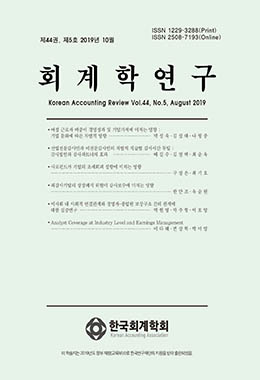경영자-종업원 보상비율이 경제적 관점 및 행동적 관점에서 기업가치에 유의미한 영향을 미칠 수 있으므로 보상구조의 적절한 설계와 공정성 및 투명성이 담보되어야 한다. 특히 이사회가 경영자 보상의 설계 및 집행을 견인하는 직접적인 역할을 수행하므로 이사회와 사외이사의 독립성이 매우 중요하다. 그러나 이사회 내 사내이사와 사외이사 간 지연·학연 등으로 사회적 연결관계가 형성되는 경우 이사회의 실질적인 독립성 및 견제·감시 기능이 약화되어 적절한 보상구조의 설계에 부정적인 영향을 미칠 수 있다. 본 연구는 이사회 내 사회적 연결관계가 경영자-종업원 보상비율에 미치는 영향을 알아보고 더 나아가 이사회의 비효율적인 구조가 경영자-종업원 보상비율과 경영성과 간의 관계에 미치는 영향을 검증하고자 한다. 2011년부터 2016년까지 한국거래소의 유가증권시장에 상장되어 있는 기업들을 대상으로 분석한 결과는 다음과 같다. 첫째, 이사회 내 사내이사와 사외이사 간 사회적 연결관계와 경영자-종업원 보상비율 간의 양(+)의 관계를 발견하였다. 이는 독립적인 위치에서 경영자를 견제하고 모니터링 해야 할 사외이사가 사내이사들과 유대적인 관계를 맺음으로써 경영자에게 우호적인 보상을 제공하고 있음을 보여준다. 둘째, 경영자-종업원 보상비율과 차기 기업성과 간 ∩형의 비선형관계가 존재함을 분석하였다. 이는 경영자-종업원 보상비율이 높을수록 차기 경영성과에 긍정적인 영향을 주고 있으나, 경영자 보상이 적정 수준을 초과하는 경우 오히려 종업원의 충성심과 협력심을 떨어뜨려 차기 성과에 부정적인 영향을 미칠 수 있음을 시사한다. 셋째, 이사회 내 사내이사와 사외이사 간의 사회적 연결관계가 강할수록 경영자-종업원 보상비율과 차기 기업성과 간의 양(+)의 관련성이 약화되고 있음을 검증하였다. 본 연구는 이사회 내의 사회적 연결관계를 정교한 방법으로 측정하여, 이사회와 경영자-종업원 보상구조 간의 관계에 대한 이해를 돕고, 무엇보다 이사회의 실질적인 독립성의 확보가 중요하다는 정책적 시사점을 제공한다.
This study examines the association between social ties within the board and executive-employee pay disparity. This study also investigates the relationship between pay disparity and firm performance, and whether social ties affect the relationship.
We use on average employee and inside director pay information to measure the pay disparity, and we estimate the intensity of social ties based on region and school relations information using the concept of density from social network theory. Using KOSPI market listed firms over the period from 2011 to 2016, we find that social ties within the board are positively associated with pay disparity, indicating that friendly boards with strong social ties award higher level of compensation to CEOs. In addition, we find the concave relationship between pay disparity and firm performance, suggesting that up to a certain level of pay disparity, the incentive effects dominate fairness considerations, but the domination reverses beyond the level. More importantly, we find the positive relationship between pay disparity and firm performance is attenuated in firms with strong social ties within the board. The results indicate that when friendly boards with strong social ties compromise arms-length contracting, greater pay disparity may increase employees' perception of inequality and lead to lower firm performance.
Our study contributes to the literature on executive compensation and the monitoring role of board of directors. Our study also has regulatory implications on the role of substantively independent outside directors in determination of compensation structure and levels to effectively reduce agency problems and enhance firm value.


